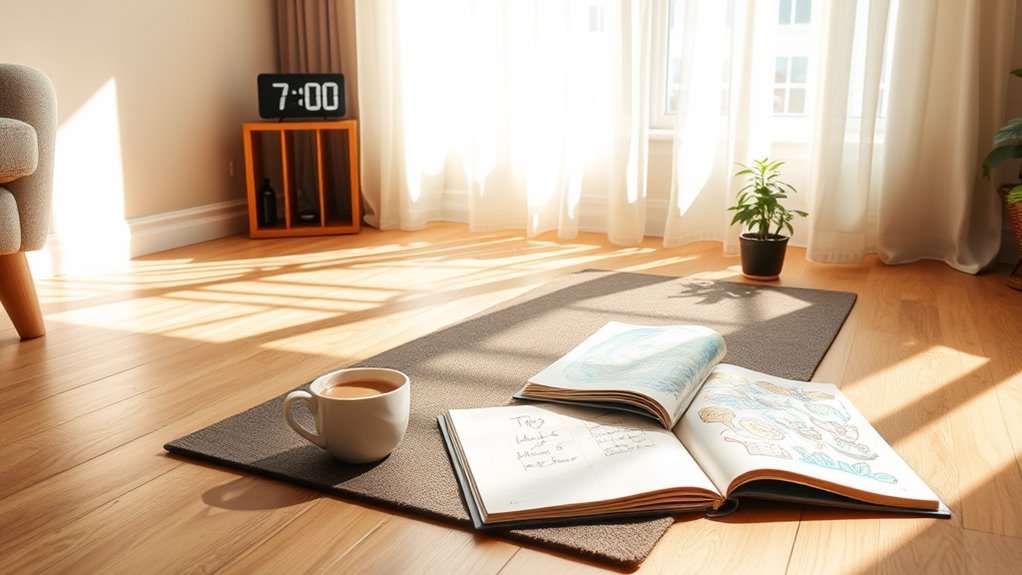The Nightly Rituals That Will Help You Sleep Through the Night
To sleep through the night, establish a consistent sleep schedule by going to bed and waking up at the same time daily. Create a calm sleep environment with cool temperatures and minimal noise. Limit screen time at least an hour before bed and incorporate relaxation techniques like deep breathing or gentle yoga. Consider herbal teas or light snacks before sleep, and keep a sleep diary to track habits. Explore these nightly rituals to enhance your nighttime routine further.
Key Takeaways
- Establish a consistent sleep schedule by going to bed and waking up at the same time every day, even on weekends.
- Create a calm sleep environment by controlling room temperature, using blackout curtains, and minimizing noise.
- Limit screen time at least an hour before bed to reduce blue light exposure and boost melatonin production.
- Incorporate relaxation techniques like deep breathing, gentle yoga, or visualization to calm the mind and ease tension.
- Track sleep patterns and evaluate factors affecting sleep quality to identify areas for improvement in your nightly rituals.
Establishing a Consistent Sleep Schedule
When you prioritize a consistent sleep schedule, you’ll find it easier to drift off each night. By going to bed and waking up at the same time daily, you’ll train your body’s internal clock, leading to better sleep.
This rhythm not only enhances the quality of your rest but also promotes overall health. Aim for seven to nine hours of sleep, adjusting gradually if needed. Avoid drastic changes to your schedule, as they can disrupt your body’s natural pattern. Additionally, making one simple nightly change in your routine can further elevate your sleep quality.
Consistency is key, so stick to your routine even on weekends. Incorporating rituals like winding down before bedtime can further reinforce this habit, ensuring you maximize your chances for rejuvenating sleep.
Commit to this practice, and you’ll reap the benefits of better sleep.
Creating a Calm Sleep Environment
A consistent sleep schedule lays the groundwork for better rest, but the environment where you sleep plays a significant role too.
To create a calm sleep environment, start by controlling the temperature; a cool room often promotes deeper sleep. Invest in blackout curtains to block out disruptive light and minimize noise with soft, soothing sounds or white noise machines.
Your bedding matters—choose comfortable sheets and pillows that support your preferred sleeping position. Declutter your space, as a tidy room fosters tranquility.
Finally, consider incorporating calming scents, like lavender, to signal your brain that it’s time to wind down. Additionally, practicing relaxation techniques before bed can help ease your mind and prepare your body for sleep.
Limiting Screen Time Before Bed
If you want to improve your sleep, cutting back on screen time before bed is essential.
The blue light from devices can mess with your body’s natural sleep signals, making it harder to drift off.
Instead of scrolling, consider picking up a book or enjoying a calming activity to wind down. Prioritizing sleep as a fundamental aspect of self-care can significantly enhance your overall quality of life.
Blue Light Impact
As you wind down for the night, it’s essential to reflect on how blue light from screens can disrupt your sleep. This light, emitted by phones, tablets, and computers, interferes with your body’s production of melatonin, the hormone that regulates sleep.
The result? You find it harder to fall asleep and wake up feeling less refreshed. To master your nighttime routine, consider setting a screen curfew at least an hour before bed.
Instead of scrolling through social media or binge-watching shows, allow your mind to unwind without digital distractions. Opt for dim lighting and soothing activities that promote relaxation. Incorporating simple nighttime rituals can further enhance your sleep quality and overall well-being.
Alternative Evening Activities
What can you do to replace screen time with calming activities before bed? Embracing alternative evening activities can markedly enhance your sleep quality. Here are three ideas to inspire a tranquil night routine:
-
Read a book: Choose something light and engaging. Let the pages transport you to another world, easing your mind from daily stresses.
-
Practice gentle yoga****: Flow through calming poses, focusing on your breath. This physical activity will help release tension and prepare your body for rest.
-
Journal your thoughts: Reflect on your day by writing down your feelings or gratitude. This practice can clear your mind and promote a peaceful mindset before sleep. Additionally, incorporating a simple evening routine can enhance relaxation and create a calming end to your day.
Incorporating Relaxation Techniques
While winding down for the night, incorporating relaxation techniques can greatly enhance your sleep quality.
Start with deep breathing exercises; inhale slowly through your nose, hold for a moment, and exhale through your mouth. This simple practice calms your mind and lowers stress levels.
Next, try progressive muscle relaxation—tense each muscle group for a few seconds, then release. This technique helps you become aware of tension and promotes a sense of ease.
Visualize a serene setting, immersing yourself in the details to shift your focus from daily worries.
Finally, consider gentle yoga or stretching to release physical tension. By integrating these methods into your evening, you create a peaceful shift into restful sleep, empowering your nightly ritual.
Developing a Pre-Sleep Routine
To improve your sleep quality, you need a solid pre-sleep routine.
Start by establishing a consistent sleep schedule and limit screen time before bed.
Creating a relaxing environment can also help signal to your body that it’s time to wind down.
Establish Consistent Sleep Schedule
Establishing a consistent sleep schedule is essential for improving your overall sleep quality, as it helps regulate your body’s internal clock.
By going to bed and waking up at the same time every day, you’ll enhance your body’s ability to cycle through sleep stages effectively.
To master this routine, consider these key practices:
-
Set a fixed bedtime****: Choose a time that allows for 7-9 hours of sleep and stick to it, even on weekends.
-
Create a wind-down period****: Dedicate 30 minutes to relaxing activities before sleep, like reading or gentle stretching.
-
Limit naps: If you need to nap, keep it short (20-30 minutes) and avoid late-afternoon naps that can disrupt nighttime sleep.
Consistency is your ally in achieving restorative sleep.
Limit Screen Time Before
Limiting screen time before bed is essential for fostering a restful night’s sleep, as the blue light emitted by devices can interfere with your body’s production of melatonin. To optimize your pre-sleep routine, consider implementing a digital curfew. Aim to disconnect at least an hour before you sleep. Use this time for calming activities that help prepare your mind and body for rest.
| Screen Time Limits | Recommended Alternatives |
|---|---|
| 1 hour before bed | Reading a book |
| 30 minutes before bed | Gentle stretching |
| 15 minutes before bed | Meditation or deep breathing |
Create Relaxing Environment
Creating a relaxing environment sets the stage for quality sleep after you’ve unplugged from screens.
Transform your space into a sanctuary that nurtures tranquility. Here are three essential elements to enhance your pre-sleep routine:
-
Soft Lighting: Use dim, warm lights or candles to create a soothing atmosphere, signaling to your body that it’s time to wind down.
-
Comfortable Bedding: Invest in high-quality sheets and pillows that invite you into a cocoon of comfort, promoting restful sleep.
-
Calming Scents: Incorporate aromatherapy with lavender or chamomile, using essential oils or candles to envelop your space in relaxation.
Opting for Herbal Teas and Light Snacks
As you wind down for the night, opting for herbal teas and light snacks can greatly enhance your sleep quality. Herbal teas, like chamomile or valerian root, soothe your nervous system, signaling your body that it’s time to relax.
Steer clear of caffeine and sugary additives, as they can disrupt your rest. Pair your tea with light snacks that promote sleep, such as almonds or a banana. These foods contain nutrients that support melatonin production and stabilize blood sugar levels.
Keep portions small to avoid discomfort and guarantee your body isn’t working hard to digest. By consciously choosing these calming options, you set the stage for a peaceful night’s sleep and wake up refreshed, ready to seize the day.
Practicing Mindfulness and Meditation
Mindfulness and meditation offer powerful tools to enhance your nightly routine.
By incorporating these practices, you can cultivate a serene mindset conducive to restful sleep.
Here are three effective techniques to contemplate:
-
Breath Awareness: Focus on your breath, inhaling deeply through your nose and exhaling slowly. Visualize the air calming your mind with each cycle.
-
Body Scan: Lie down comfortably and mentally scan your body from head to toe, releasing tension with every breath.
-
Guided Visualization: Picture a peaceful place—like a tranquil beach or a serene forest—immersing yourself in the sights, sounds, and scents of that environment.
Keeping a Sleep Diary
Many people find that keeping a sleep diary can greatly improve their sleep quality. By tracking your sleep patterns, you gain valuable insights into what helps or hinders your rest.
Each morning, jot down the time you went to bed, the time you woke up, and any nighttime awakenings. Also, note factors like caffeine intake, exercise, and stress levels.
Over time, you’ll identify trends and correlations that could transform your sleep routine. This conscious awareness empowers you to make informed adjustments, enhancing your nightly rituals.
Make it a habit to review your entries weekly; you’ll notice patterns emerge, guiding you toward mastery over your sleep habits. A sleep diary is a powerful tool for achieving ideal rest.
Evaluating Your Sleep Quality
Understanding your sleep quality is essential for improving your nightly rest. By evaluating your sleep, you can identify patterns and make informed adjustments.
Consider these three key factors:
-
Duration: Aim for 7-9 hours of uninterrupted sleep, allowing your body to cycle through all stages of rest.
-
Restfulness: Assess how refreshed you feel in the morning. If you’re waking up groggy, it may indicate disrupted sleep cycles.
-
Sleep Interruptions: Track how often you wake up during the night. Frequent awakenings can signal underlying issues that need addressing.
Frequently Asked Questions
What Are the Best Bedtime Snacks for Sleep?
To enhance your sleep, choose snacks like almonds, cherries, or oatmeal. These foods contain sleep-promoting nutrients, helping your body relax. Avoid heavy or sugary options that might disrupt your rest. Enjoy a light, calming snack!
How Can I Wake up Refreshed in the Morning?
Ironically, you think you can conquer mornings without a solid routine. To wake up refreshed, set a consistent sleep schedule, limit screen time before bed, and create a calming environment. Your mastery starts tonight.
Is Napping During the Day Beneficial for Sleep?
Napping during the day can be beneficial if done strategically. Short naps boost alertness and cognitive function, but long ones might disrupt your nighttime sleep. Listen to your body and find the right balance for you.
Can Exercise in the Evening Affect My Sleep?
Evening exercise can boost your energy and heart rate, making it harder to drift off. However, if you time it right, you might just find a sweet spot that helps you sleep even better.
What Should I Do if I Can’t Fall Asleep?
If you can’t fall asleep, try relaxing techniques like deep breathing or reading. Avoid screens, and make certain your environment’s comfortable. Establish a gentle routine to signal your brain it’s time to wind down.





